Creating America’s Future Farmers
by Linda Salisbury
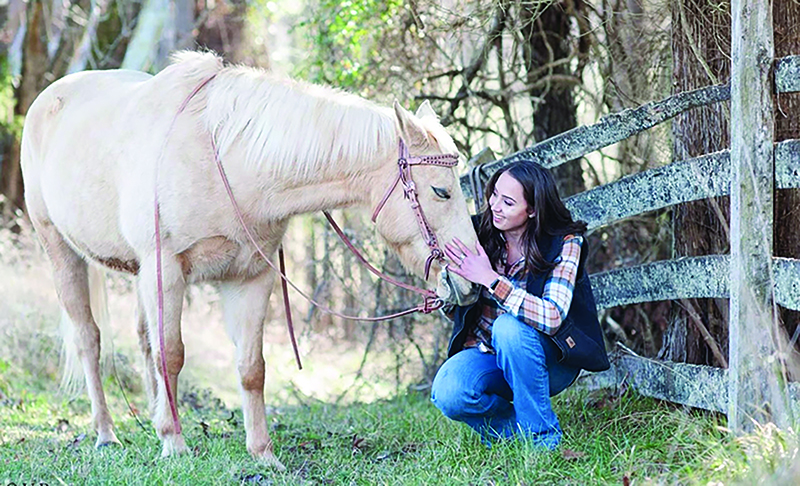
FFA advisor Kristin Watkins has always loved horses (submitted photo by LCHS).
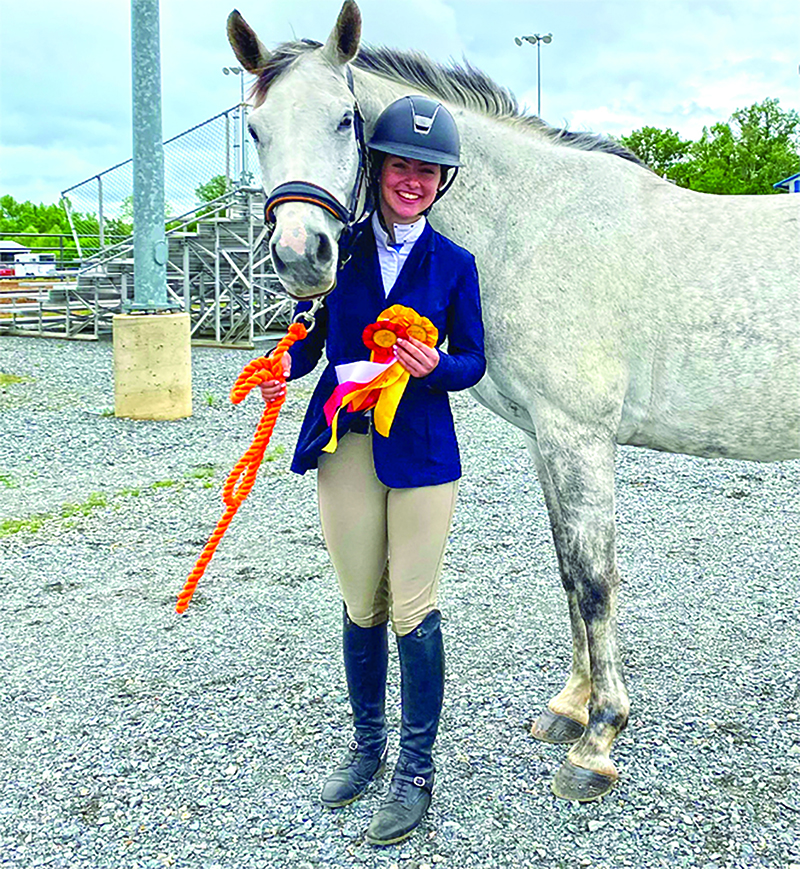
Samantha Goodwin and her horse Pecos display ribbons they won at the Hidden Haven Show in Meadow Event Park in Doswell (submitted photo).
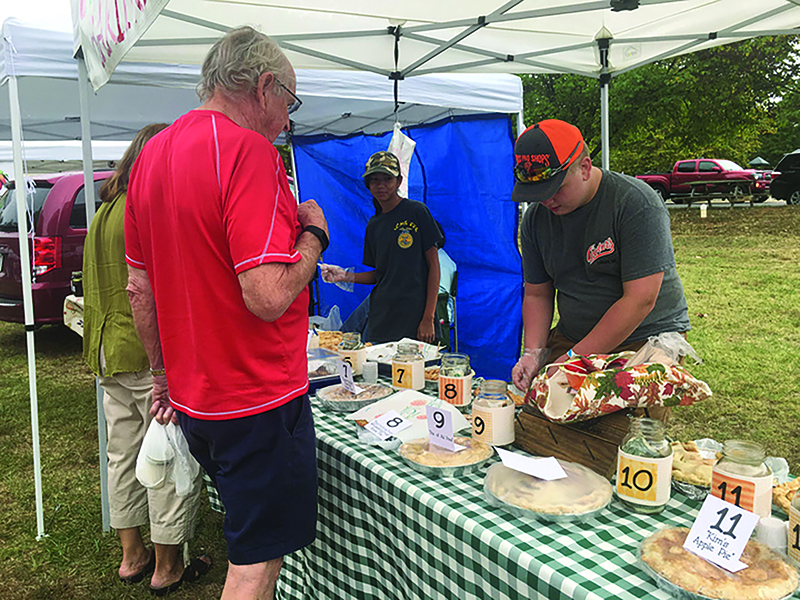
FFA students sell apple products they processed in Miranda Moyer’s class at Louisa County High School (submitted photo by LCHS).
Imagine raising chickens; growing plants; studying cows, horses, hogs, and sheep; or even making apple butter as part of your school day – and getting graded for it. And best yet, finding a path to a fulfilling, valuable career through these educational programs and leadership training. Just imagine!
These opportunities are available through the Future Farmers of America (FFA) in conjunction with Louisa County High School’s educational offerings. And they are propelled by the teachers’ and students’ passions for all aspects of agriculture.
FFA is a Supervised Agricultural Experience (SAE) project and is incorporated into high school curriculum. SAE provides hands-on experience in the areas of horticulture, veterinary science, and livestock. Additional department courses include landscaping, grounds maintenance and preparing fields for games.
As a testimony to its success, the local program is a stepping stone for college and university educations. And its students have won local and state awards.
“Recently we had two teams compete in Career Development Events (CDEs) at the Virginia FFA State Convention at Virginia Tech in Blacksburg,” explained Kristin Watkins, an agriculture teacher and FFA advisor. “[The fields were] veterinary science and horse hippology (the study of all aspects of horses, from grooming to showing). Our hippology team placed fourth in the state.”
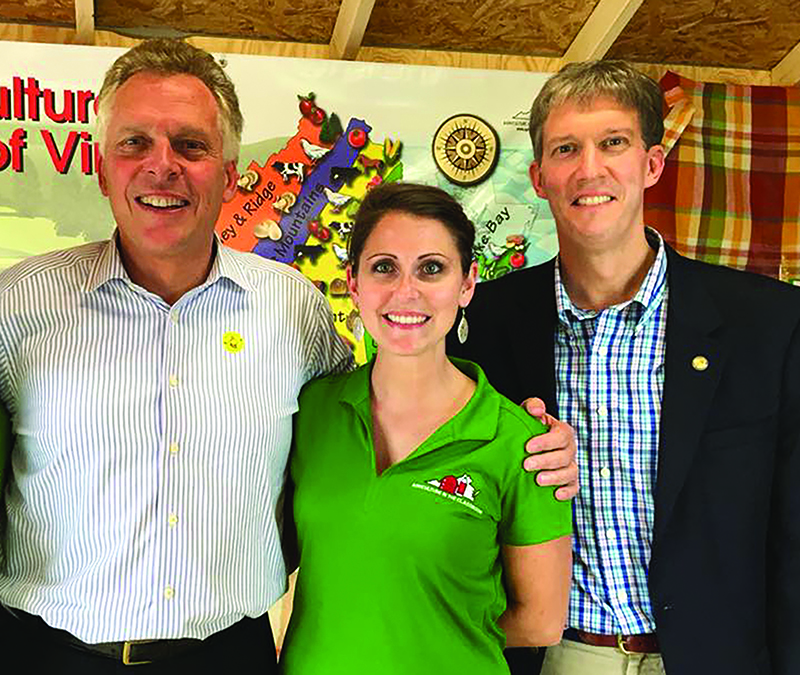
Former Governor Terry McAuliffe, FFA Secretary Whitney Perkins, and Virginia Secretary of Agriculture and Forestry Todd Haymoore meet during the State Fair of Virginia\(submitted photo).
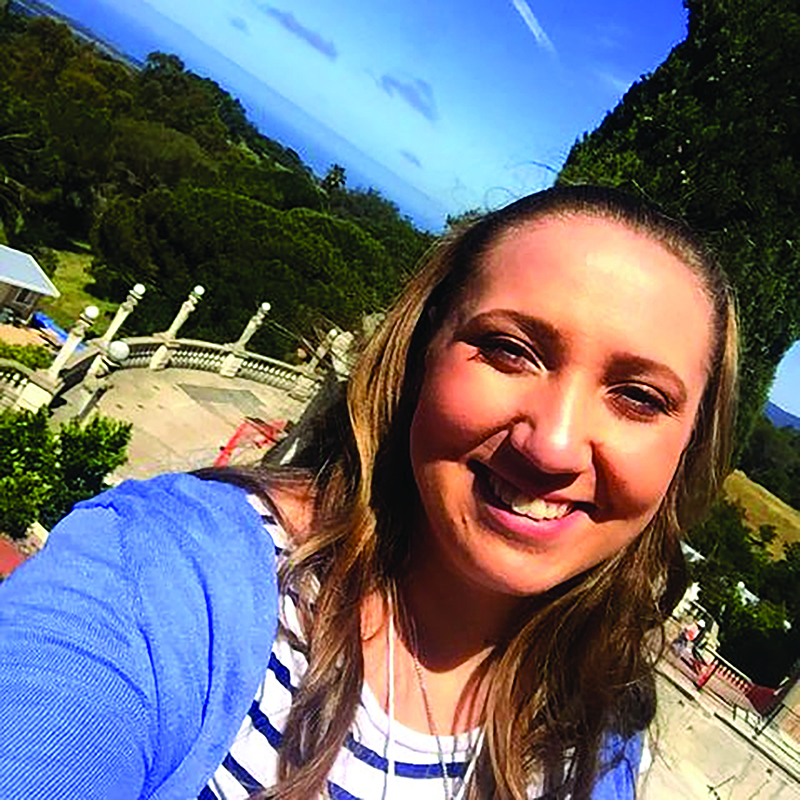
Mackenah Roberts is an FFA advisor in horticulture (submitted photo by LCHS).
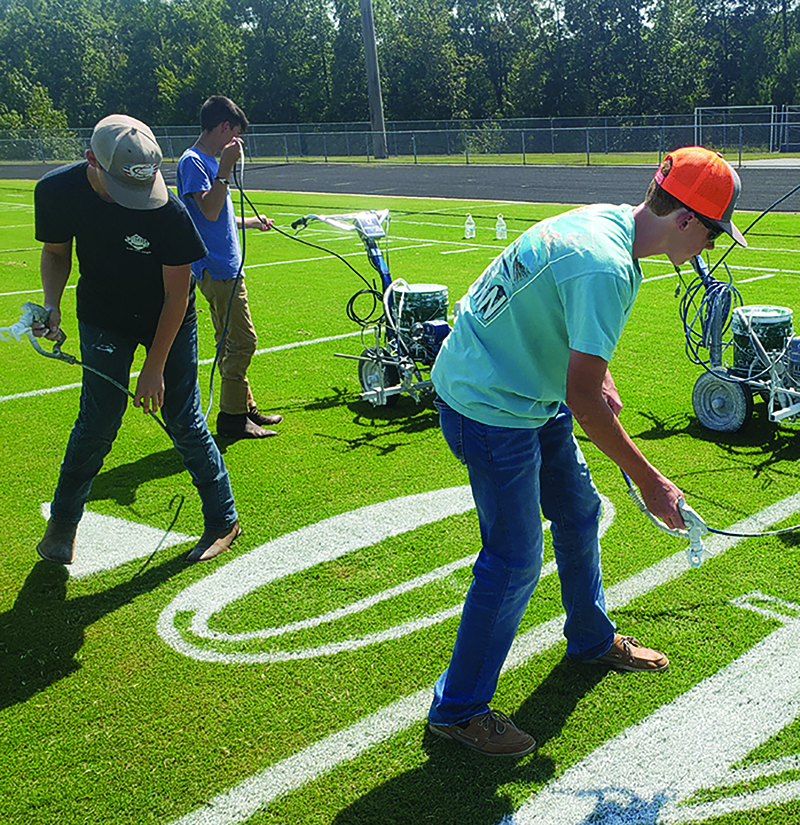
Some of Logan Horne’s students develop an athletic field during class (submitted photo by LCHS).
She added, “One of our members, Savannah Goodwin, was [just] elected to state FFA office. This is a huge accomplishment, one that hasn’t [happened] in Louisa in many years. We also [had] a group of students going to FFA leadership camp in July.” Whitney Perkins, a 2009 LCHS grad, was the state FFA secretary, the last LCHS student to reach state office before Goodwin.
FFA is a national agricultural organization founded in 1928 with strong Virginia roots. Run locally out of Apple Grove, the group has morphed through the decades to diversify its membership to include black people and women and to keep up with modern agricultural practices.
Louisa’s FFA advisors provide the spark of joy based on their own passions for the program. The three˗person team includes Mackenah Roberts, Kristin Watkins, and Miranda Moyer. Logan Horne, a 2008 graduate and Louisa native, is the fourth teacher involved with the program. He is not part of FFA but teaches about turf, soil, and more. His students, however, may be FFA members.
A graduate of Virginia Tech, Watkins, another Louisa native, was a member of FFA and 4-H while growing up. She showed sheep, cattle, and horses at the state level through FFA and became a livestock judge.
“My dad loaned me money to purchase my first heifer,” she recalled. “I wouldn’t have been able to show livestock without my family’s financial support. The livestock they purchased for me as a youth actually grew my herd to what it is today.”
Watkins and her husband operate a Simmental and Angus cattle herd in Louisa. At the high school, she’s in charge of the animal systems and livestock courses but said she has a “passion for all things agriculture.”
Moyer, who hails from Elverson, Pennsylvania, did not grow up on a farm. Her family had a small vegetable garden and ornamental flowers, she said. Her passion was sparked when she took a horticulture class. “It blew me away,” she explained.
Moyer was elected vice president of her high school FFA. “It shaped who I am today,” she said. “I learned it was my calling.” Moyer went on to serve as the Pennsylvania State FFA treasurer and later attended\Penn State with a focus in agriculture education. Upon graduation, she\found a job opening in Louisa. She finds Louisa a place where schools and the community “have a lot of passion.”
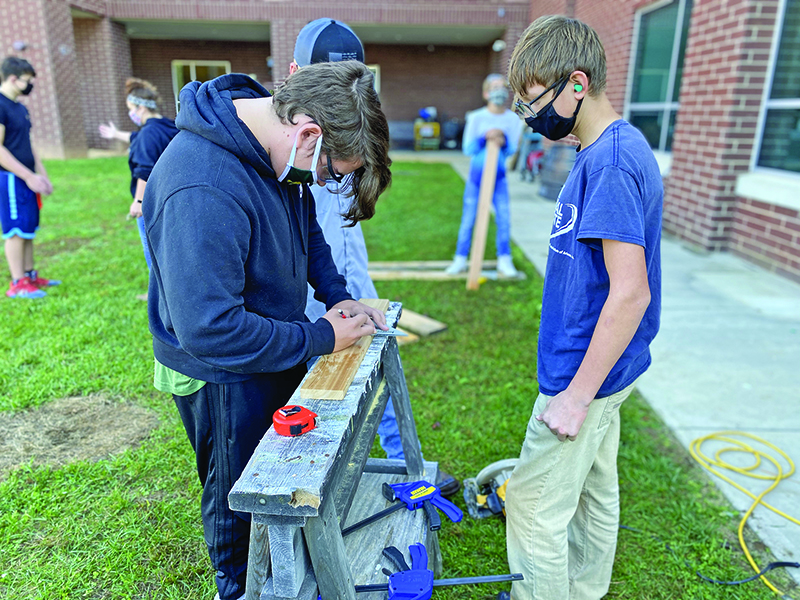
Students learn woodworking skills in one of Miranda Moyer’s classes (submitted photo).
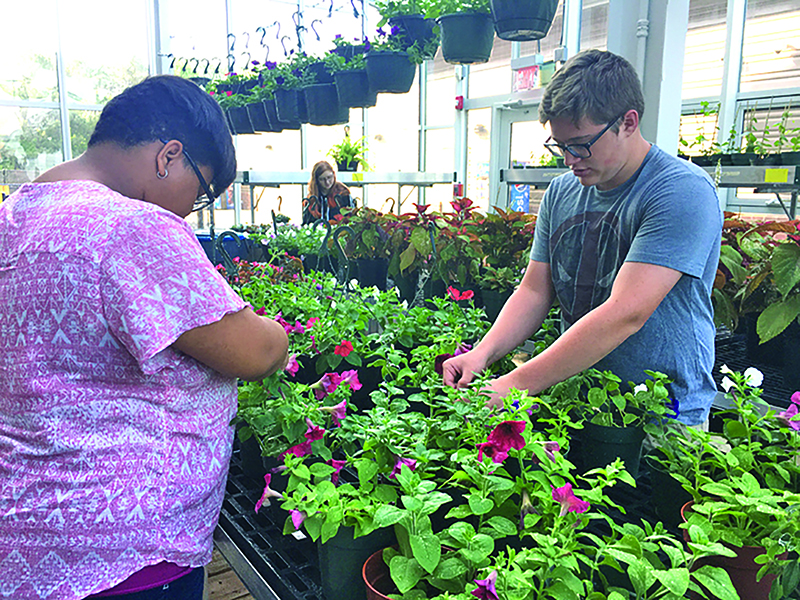
Miranda Moyer’s students tend flowers in the greenhouse (submitted photo).
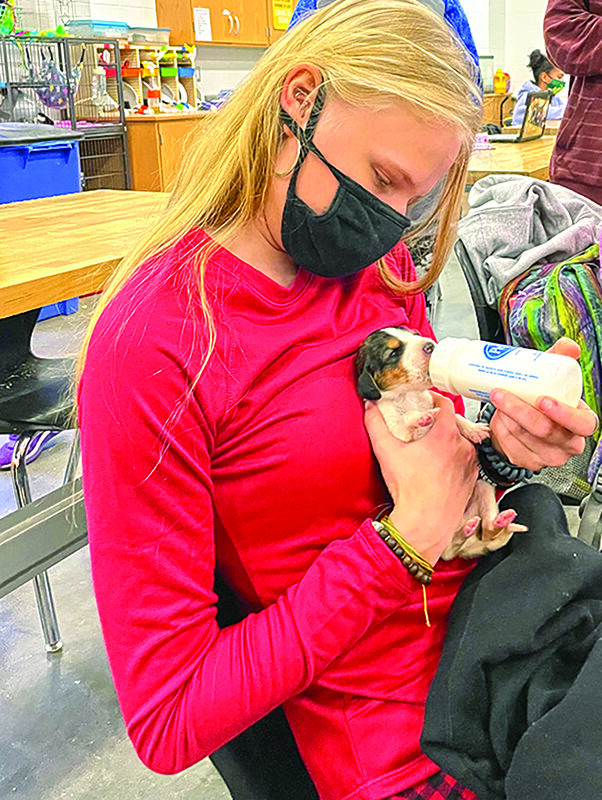
Student Emma Haney bottle feeds an orphaned puppy in Mackenah Roberts’ class (submitted photo).
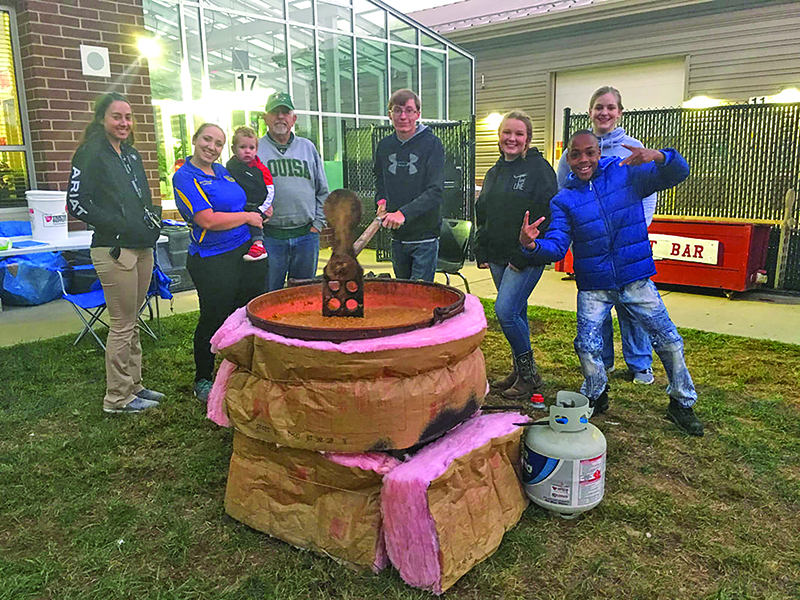
Students in several FFA classes learn about the equipment used for apple processing (submitted photo).
Moyer’s focus is teaching horticulture, but she also instructs about many other subjects including food safety and preservation, soils, turf and landscape, hydroponics, floral design, woodworking, electrical wiring, plumbing, pest management, and livestock management.\
The school has provided a small greenhouse and a large garden with several raised beds for them to use. The FFA also raises chickens on the property. It started with egg-producing hens, but that was labor intensive because of egg gathering. Thus, they are switching to raising market poultry.
Financially, the FFA raises funds in several ways, including selling plants and apple butter. The program buys the apples, and all classes help in processing it. Throughout their classes, students learn skills such as record keeping, which they will need if they go into business.
Students also learn the basics of livestock anatomy, and Watkins teaches them the business of farming and equine science. Like her fellow advisors, she brings community members such as a blacksmith or a farrier into the classroom to share their expertise. Farms also loan large animals for a week or two. She said that Chris Gibson and his family donated Hampshire hogs to the program. “My students raised them on campus, and we sold the pork as a fund raiser,” Watkins recalled.
Horne’s students must be prepared to become wet or dirty while working on landscaping or turf management in the fields and walking trails at the school. Their studies could eventually lead to jobs landscaping golf courses or preparing professional sports stadiums by painting lines or letters for different kinds of games.
Roberts brings a wealth of life experience into the classroom. She knows well the difficulty of transferring to a new school in the middle of a high school year, especially if it is a major geographical change. However, her unexpected move to urban New York City from rural Nevada during high school led to a deeper commitment to agriculture and FFA.
“It was a tough transition,” Roberts said. She wanted to continue FFA and agriculture classes so she attended John Bowne High School in Queens. It was there that Roberts participated in the school’s intense agricultural curriculum and benefited from its excellent teachers.
After graduation, Roberts received a B.T. in animal science from SUNY Cobleskill and then went on to North Carolina State University. In order to teach in New York state, she needed a master’s degree, which is why she attended North Carolina State. However, due to agricultural teacher shortages, she\was able to seek employment in surrounding states while completing her degree. That led her to the position in Louisa, and she completed her masters of agriculture and extension education in 2019.
Roberts teaches about small animals and veterinary science. Her classroom is filled with pocket pets and small animals. At times there are “seven guinea pigs, three rabbits, two ferrets, chinchillas, two turtles, and a bearded dragon,” or more. Although some students expect to just play with the animals, they soon learn that there are serious studies involved. The veterinary science section involves learning skills that are important in a veterinary career or on a farm, such as how to fill a syringe or identify parasites.
This knowledge and experience can lead to careers in these fields, and that’s where students such as Goodwin and other graduates come in. Like her dedicated teachers and advisors, she found her love of FFA at an early age. Goodwin was raised on her family’s 100-year-old cattle farm in Bumpass. She joined FFA in middle school, and her passion has always been horses. Goodwin’s skills led her to excellence in horse shows, showcasing not only her riding ability, but also her knowledge of hippology.
Goodwin became deeply committed to FFA in high school, where she was elected president of her chapter. Having just been elected State FFA Reporter, Goodwin will work with traditional media, social media, and correspondence. She is taking a gap year to travel the state and work with the state FFA. Goodwin plans to attend Virginia Tech in a year with an emphasis in dairy science. During her FFA travels since graduation, she and other members have visited Congress and toured the Capitol with District 7’s representative, Abigail Spanberger, to discuss agricultural issues.
Like Goodwin, Perkins grew up on her parents’ two cattle farms. Her family owns cows and calves, selling calves to be raised for beef. Although her after-school responsibilities included farm chores, she hadn’t thought about an agricultural career until sixth grade when the curriculum cycled through six weeks of various electives, including dance, music, art, and agriculture. She was inspired.
Perkins’ farming background and involvement in FFA – including leadership training and the high school’s agriculture program – led to her present career. Through FFA, Perkins said she went from being a very shy child to a public speaker in the state FFA and now in her career as an assistant director at the Farm Bureau Federation.
“FFA didn’t prepare me for a job; FFA prepared me for a career,” Perkins explained. “Through my experiences in my local FFA chapter and later as a state officer, I was able to direct my passions into concrete goals. Furthermore, the organization then provided me opportunities to develop a transferable skillset to obtain those goals. Skills like teamwork, communication, leadership, adaptability, networking, critical thinking and problem solving are just the tip of the iceberg. And I developed those skills all while learning about something that interested me: agriculture.”
Imagine the places young people can go with Louisa County High School’s FFA and agriculture classes. Just imagine!

